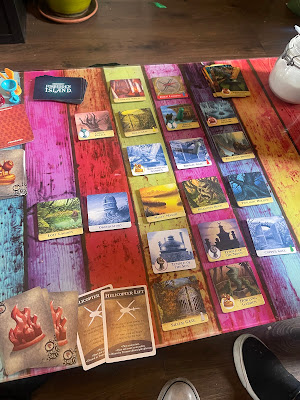I recently wrote about how I believe playing can be considered a rebellious act in a society that does not value playfulness in adults. Bizarrely, this received more backlash than I was expecting from people who did not appreciate me thinking more deeply about the sociology of playing games. While I firmly believe that choosing "unproductive" play in a society that favours productivity, is inherently rebellious, I am aware that some people prefer to focus on the inward-facing benefits of play. Or perhaps my attempt to look deeper into an activity they would rather just consider fun will also be met with resistance?
Saya Des Marais, writing for Psych Central ascertains that "playing is just as important for adults as it is for children. Among its many benefits, adult play can boost your creativity, sharpen your sense of humor (sic.), and help you cope better with stress". However, Proyer and Ruch, writing for SpringerOpen, claim that despite this, there has been comparatively little literature or research on playfulness in adults. I feel that this lack of research into playfulness and the benefits of play in adults supports my believe that western society does not value play in adults in the same way as it might in children.
Proyer and Ruch found that the results of their own research indicated that "playfulness in adults relates to positive psychological functioning". They highlighted the need for further studies to illuminate the contribution of playfulness to well-being in adults. Furthermore, a 2013 study in the European Journal of Humour Research, also by researcher Proyer, found that a predisposition to play in adults was positively linked to well-being and life satisfaction.
So what exactly are the benefits of adults playing games aside from just being enjoyable on a surface level?
Playfulness can be defined as "the predisposition to frame (or re-frame) a situation in such a way as to provide oneself (and possibly others) with amusement, humour, and/or entertainment". Framed the context of this article, playfulness links with table top games in their ability to frame specific themes, subjects, or actions in an entertaining way. Patchwork by Uwe Rosenberg is a perfect example of how the act of making a patchwork quilt can be reframed to make it a less arduous, more competitive, and potentially a more entertaining task.
Adults who participated in playful activities display five types of playful behaviours outlined by Proyer and Ruch: spontaneous, expressive, creative, fun, and silly. Leading on from this, people who scored higher in these characteristics were also recorded as having higher creativity, a better ability to appreciate beauty, a greater sense of hope, lower stress, among others. As such, playfulness in adults can be directly linked to a boost in overall well-being.
These characteristics may feel like they are considered as some inherent aspect of someone's personality and as such might feel inaccessible to someone who does not necessarily consider themselves playful. However, Dr. Stuart Brown, researcher and founder of The National Institute for Play, has identified eight "play personalities". People who enjoy table top gaming will undoubtedly associate with multiple personalities and below I have taken the liberty of providing suggestions on how they translate to the hobby.
- The Collector - you enjoy building collections. TCGs, Warhammer, Board games, they are all collections.
- The Competitor - you enjoy playing (and winning) against others in games that have clearly defined rules.
- The Creator - you enjoy making things. This could be miniature building and painting, or even creating our own TTRPGs.
- The Director - what table top group doesn't have that one person who drives the play, learns the rules, schedules D&D sessions?
- The Explorer - you play through discovering new things. Often linked with the Director, this is the person who will favour games not yet played to bring to the table.
- The Joker - you play games that bring out the silly or foolish in all of us. Happy Salmon anyone?
- The Kinesthete - you enjoy using your body to play. From Jenga to Junk Art, you rule at dexterity games.
- The Storyteller - you play table top games for the opportunity to create stories and get lost in the collective imagination of the group.











.jpg)